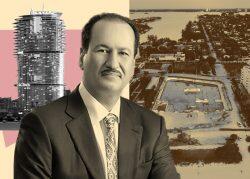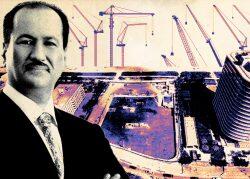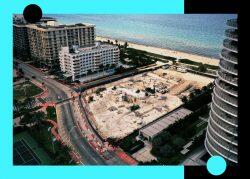Hussain Sajwani had been trying to break into U.S. real estate for years.
The Emirati billionaire’s Dubai-based development firm, Damac Properties, looked at New York properties prior to the pandemic, hoping to land a prime site near Central Park, but had no luck. So when the Surfside site became available less than two months after the condominium collapse, Damac didn’t hesitate, moving to become the all-cash stalking horse bidder for the oceanfront land.
“We immediately took action and we moved fast,” Sajwani told The Real Deal.
Brokers marketed the site for months after that but plans for an auction fizzled when no other developer wanted to touch the 2 acres of land that families of the victims – the 12-story, 136-unit Champlain Towers South collapsed in June of last year, killing 98 people – have called “hallowed ground.”
In late July, Damac closed on its $120 million purchase, making it the steward of the country’s most emotionally charged development site.
Read more



The tragedy associated with the site is not lost on Sajwani, who expressed his condolences for the families of the victims during the interview with TRD.
Damac, which Sajwani founded in 2002, has developed mostly in Dubai but also in Jordan, Lebanon, Qatar, Saudi Arabia and London. It’s known for its flash, sometimes throwing in a Lamborghini with a home purchase or raffling off private jets. It’s got a penchant for tying up with international brands, developing a Trump-branded golf course – the first in the Middle East – at Damac Hills in 2017, and is developing a 70-story Cavalli-branded tower in Dubai. (Sajwani bought the distressed luxury fashion house in 2019 through his private investment firm.)
Damac’s plans for Surfside are in the early stages. But Sajwani is clear that the project will reflect the Damac ethos: big and bold, with all the bells and whistles. When asked about the possibility of a recession – something that has put many developers in wait-and-see mode – Sajwani brushed it off, saying he is a believer in the U.S.’s resiliency.
TRD caught up with him to talk about his American debut and expansion plans.
Now that you’ve closed on the site, what’s next?
First of all, we really [want to offer] our deepest condolences for the victims of this building and what has happened. We will do anything we can to make their experience less harmful.
On the business side, we are planning to put up the most luxurious, the highest standard of condominiums in North America and in the world on that [site].
It will take a little time because we have to hire a number of consultants, architects, planners and others. We just received the land a couple of weeks ago and that normally takes a couple of months. Then the standard process takes about six to nine months between planning, designing, tendering until the construction starts.
Besides it being a Cavalli-branded building, what else can you tell us about the design?
We want to make it very luxurious, and have all the amenities and facilities in the building, from swimming pools and gyms and restaurants and services, which would qualify [it as] the most luxurious condominium globally.
Do you plan to honor the 98 victims who died in the collapse? Have you considered working with the town and the families to create a memorial?
We would love to meet with the community, with the people and I’m going to send some of my senior executives to Miami and to meet with the government officials and the city councils to see if there’s anything we can do and contribute to make that bad incident less hurtful and less bad.
What can you tell us about pricing and Damac’s timeline for this project?
It is too early but we are of course in a competitive market so we have to be competitive.
Is there a Damac project out there you can compare this to?
[Last year] we launched Cavalli tower in Dubai. We have done some interesting amenities in that building, including an artificial beach. Of course, here we don’t have to do an artificial beach – there’s one of the most beautiful beaches in the world there.
Every Cavalli tower is going to have its own style and class. And of course, we have to do a little more homework on the local demand. What the people, what our customers want, it’s very important. What the customer wants aside from an apartment, the amenities. You appreciate that every city is a little bit different.
Are you eyeing other U.S. sites?
At the moment, we want to focus on Surfside and get it off the ground. Of course we are open to other cities. We think New York has potential, and Boston – those are two cities on the East Coast where we would love to do something in the future. We have a number of projects in Toronto.
Do you want a larger footprint at the Surfside site? Would you acquire more parcels?
We are a business firm – we are always open to opportunity. If there is another piece of land next door or a few kilometers up or down, we think the market has great potential, the market is good and will continue to be good. A lot of people [are] moving to Miami, from up the East Coast and also from South America. We believe in Miami.
Any concerns about timing, given rumblings of a recession?
Our analysis of a recession, if it comes to the States, is that it’s going to be mild and it’s not going to be very long. A project like that takes one year of planning and design, and then takes about two to three years of construction. So we are not concerned about the recession. From history, and I have seen it, [the] U.S. whenever it gets in a recession it is the first one to come out. And they always come out stronger.
What is your investment target for U.S. projects over the next 10 years?
We are already quite big investors in the U.S. through private equity and we have invested in about 30 funds in biotech and technology… funds like Starwood. The U.S. has been and is always going to be a target for overseas investment. It’s the largest world economy and it’s — I wouldn’t say it’s easy but it’s more clear to do business in the U.S. — you know what is allowed and what is not allowed very quickly. This project could be in the range of half a billion dollars, and we are open to doing more.
Have you spent time in South Florida?
I know Miami very well. I come quite often.
This interview has been edited and condensed for clarity.
